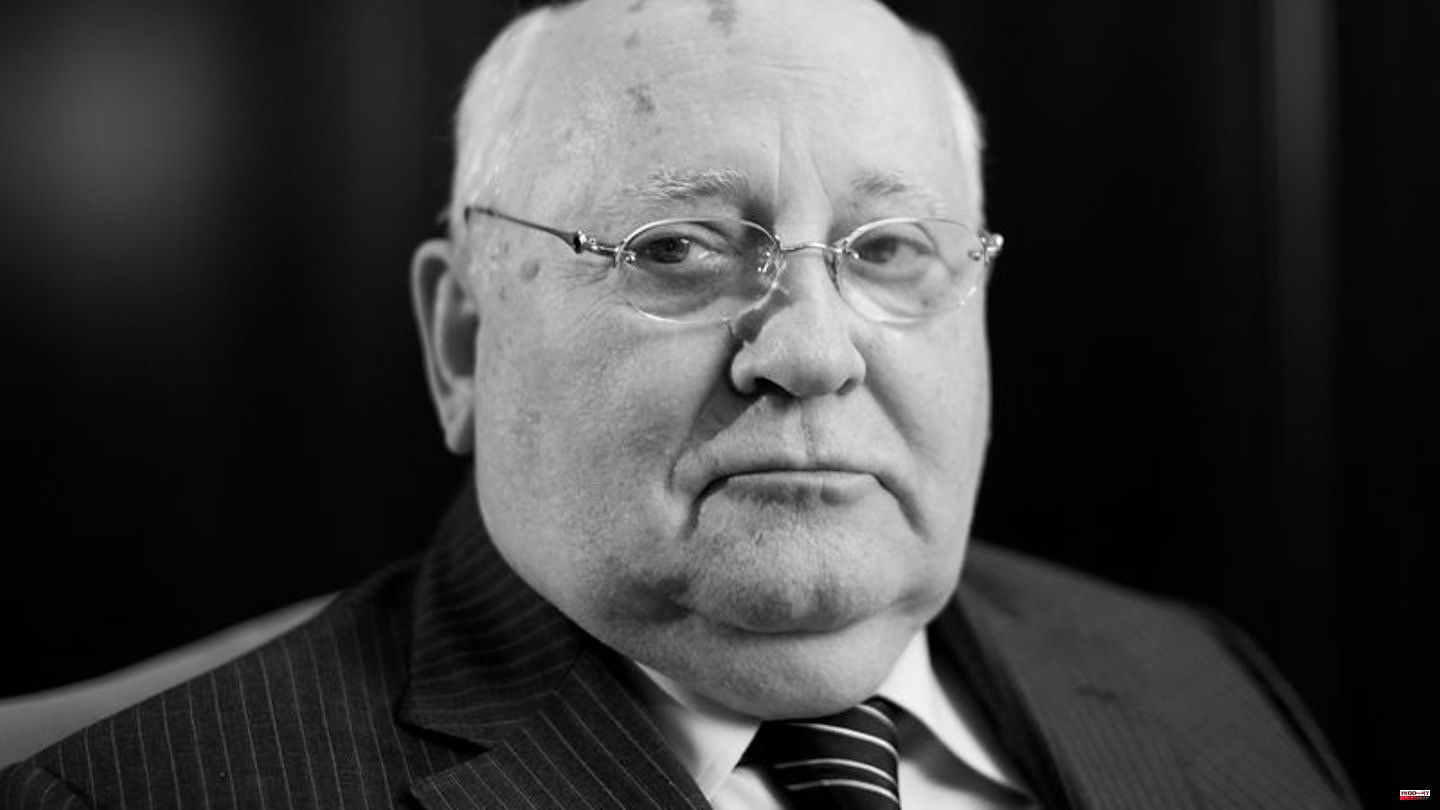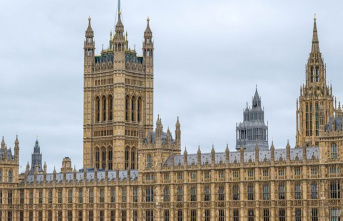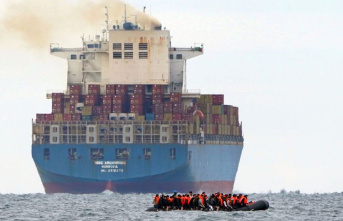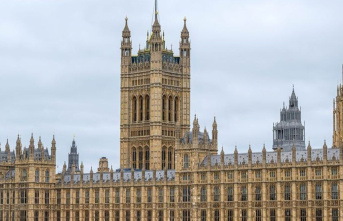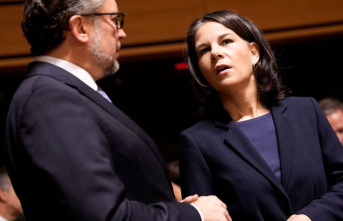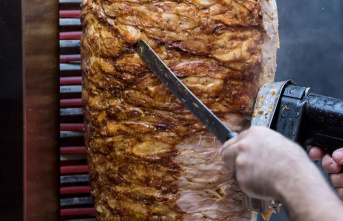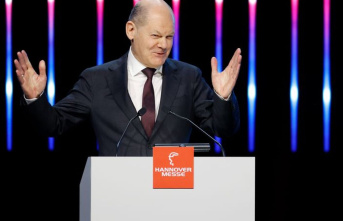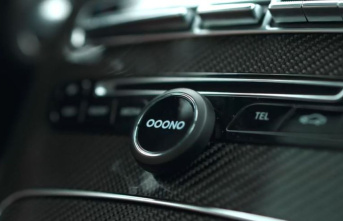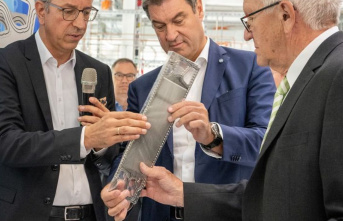He was considered one of the fathers of German unity and a pioneer for the end of the Cold War: The Russian Nobel Peace Prize winner and former Soviet head of state Mikhail Gorbachev died in Moscow on Tuesday evening at the age of 91 after a long and serious illness. This was announced by the Central Clinical Hospital (ZKB) in the Russian capital.
Politicians around the world mourned Gorbachev and remembered his legacy. However, it is completely unclear which international guests will be able to come to Moscow for the funeral in view of the Russian war of aggression against Ukraine and the EU and US sanctions against the country.
Glasnost und Perestroika
Gorbachev, who had to be hospitalized repeatedly in recent years, was valued worldwide: under his leadership, the Soviet Union signed groundbreaking treaties on nuclear disarmament and arms control with the USA in the 1980s. In his home country, Gorbachev, as General Secretary of the Communist Party, initiated an unprecedented reform process with his policy of glasnost (openness) and perestroika (restructuring). This brought unprecedented freedom to people in the totalitarian system. In 1990, Gorbachev received the Nobel Peace Prize for his courageous reforms. The political process ultimately led to the collapse of the communist empire.
East Germans in particular still revere "Gorbi", as they call him, as a statesman who brought them freedom more than three decades ago. However, a large part of the Russian population always saw the former party and head of state as the gravedigger of the Soviet Union - and as a politician without an instinct for power. Gorbachev resigned as President of the Soviet Union in 1991, before the state dissolved itself shortly afterwards. Up until his death, Gorbachev made outstanding contributions to his own political foundation in Moscow. The organization advocates democratic values and a rapprochement between Russia and the West. He also wrote numerous books.
The politician was a co-owner of the newspaper "Novaya Gazeta," which is critical of the Kremlin and repeatedly uncovers abuses in Russia. In recent years, Gorbachev has repeatedly asked Kremlin boss Vladimir Putin not to further restrict the freedom of the media and elections.
Mourning across state borders
Gorbachev's death caused grief among many politicians. According to a spokesman, Russian President Vladimir Putin also expressed his deepest sympathy. Putin will send the family a telegram on Wednesday morning, Kremlin spokesman Dmitry Peskov announced.
US President Joe Biden praised Gorbachev as a "man with a remarkable vision". According to Biden, after decades of brutal political repression in the Soviet Union, he campaigned for democratic reforms. "These were the actions of an extraordinary leader - one who had the imagination to see a different future possible and the courage to risk her entire career to achieve it. The result was a safer world and greater freedom for Millions of people."
EU Commission President Ursula von der Leyen emphasized the importance of Gorbachev for Europe. "He played a crucial role in ending the Cold War and the fall of the Iron Curtain," von der Leyen wrote on Twitter. She described Gorbachev as a leader who was reliable and respected. "He paved the way for a free Europe. We will never forget this legacy."
UN Secretary-General António Guterres was "deeply saddened". Guterres said Gorbachev was a "unique statesman" who changed the course of history. "He did more than anyone else to bring the Cold War to a peaceful end."
British Prime Minister Boris Johnson paid tribute to Gorbachev's historical legacy. "I have always admired the courage and integrity he showed in bringing the Cold War to a peaceful end," Johnson wrote on Twitter.
French President Emmanuel Macron praised Gorbachev as a "man of peace". Macron wrote on Twitter that his decision opened "a path to freedom" for the Russians. "His commitment to peace in Europe has changed our common history."
Several federal politicians also paid tribute to the Nobel Peace Prize winner shortly after his death became known. Without Gorbachev, "the peaceful revolutions in the countries of the Eastern bloc, here, would not have been conceivable," wrote Bundestag Vice President Katrin Göring-Eckardt (Greens) on Twitter. "His words have encouraged us, made me strong."
Germany owes a lot to Gorbachev, Federal Education Minister Bettina Stark-Watzinger (FDP) wrote on Twitter. "He ushered in the end of the Cold War, enabled Germany's reunification and gave his country a democratic momentum. A brave man of conviction whose voice will be missed." CDU leader Friedrich Merz wrote on Twitter that without Gorbachev, "German unity in freedom" would not have been possible.
Sanctions could affect funeral
Gorbachev is buried in Moscow at the New Maiden Cemetery for celebrities - next to his wife Raisa. The statesman had arranged this long before his death. However, it is uncertain which international guests will come to the funeral. Not only have many high-ranking politicians in the EU been banned from entering the country by the Russian side as a reaction to the Western sanctions. The airspace in Russia is also blocked for "unfriendly EU countries".

